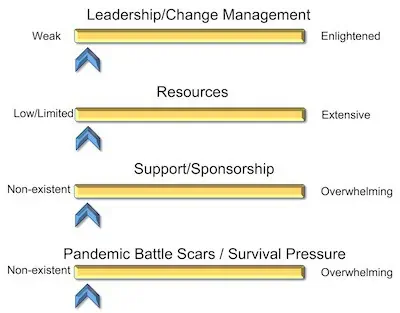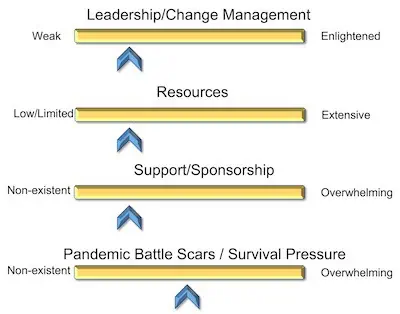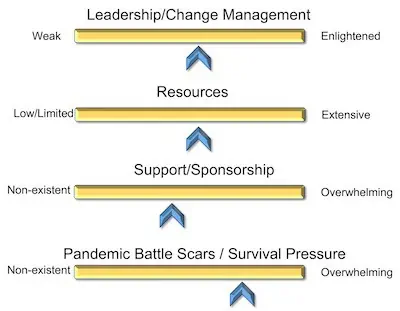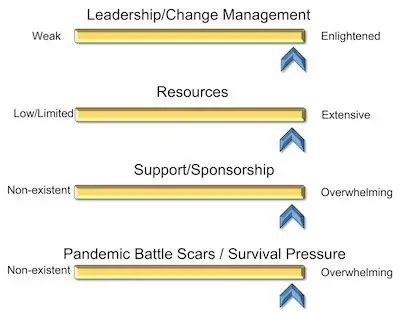As pandemic related restrictions are lifted in our personal and professional lives, the key question is what will our lives be like? What will our new normal be? How will Supply Chain progress?
The level of Supply Chain disruption has been pervasive, unrelenting and indiscriminate. Still there is a danger that once we get past the pandemic people will just go back to their old ways, ignoring all of the signals that things need to be improved.
As such we conducted a poll to determine how Supply Chain progress will be manifested in the future. Will companies be in denial and make no improvement or will they understand the lessons of the pandemic induced disruptions and work to make major improvements?
The Poll
A recent article we published, Supply Chains Are Broken! Denial Will Kill Your Company! focussed on this very real concern. Once the pandemic is over far too many people will forget the level of devastation and disruption in virtually all Supply Chains.
In this forgetfulness they will make no effort to improve the resilience and robustness of their Supply Chains. Future disasters (there is always something, even if not as widespread as a global pandemic) will surely cause enormous problems, even if they are more localized to a company, a geography, or an industry.
On the other end of the spectrum, those companies who have become enlightened by the pandemic’s impact, will make the necessary investments in resources, systems, processes, infrastructure and capabilities so that they are better prepared in the future. That enlightenment may have come from great visioning or it may have come from fear. In either case these companies are motivated to make great improvements.
In order to get a sense of where companies stood on this matter we conducted a poll. Our question was:
“When the Pandemic is over will your company improve its Supply Chain operations?”
People were asked to select one of the following 4 options:
- In denial and won’t change (Denial)
- Wants to but doesn’t know how to (Status Quo)
- Will make modest improvements (Modest)
- Will make serious investments (Serious)
The responses should give us a good idea of where companies were going to fall on this Supply Chain progression spectrum.
Would they do nothing because they have no desire? Would they do nothing because they don’t know how to proceed? Would they make modest, perhaps superficial, changes? Or would they make deep, significant improvements commensurate with the impact that the pandemic had?
The Results
We conducted the poll on supplychaingamechanger.com and on social media. The results feel directionally correct even if they are not necessarily statistically significant.

As shown in the graph, those companies that are in Denial and won’t take any action constitute 14% of the respondents. 22% would like to take action but don’t know how to or where to start. Another 32% will make some level of improvement, albeit Modest. And finally 32%, or 1/3, will make serious and extensive improvements to their Supply Chain.
Not to surprisingly there are companies in every state and condition. We certainly hoped that a global pandemic would shake everyone out their inertial state but that is not the case. We would also hope that more companies were going to make significant changes, but it is somewhat encouraging that 2/3 of our respondents will at least make some effort at improvement.
Interpreting the Results
In order to interpret each of the answers on Supply Chain progress we also felt that they should be measured and considered across several dimensions:
- a. Leadership/Change Management
- The level of true leadership, visioning, strategic thinking and change management experience and expertise in a company is reflected in how they respond to the situation
- b. Resources
- The breadth and depth of existing resources, and the ability and willingness to invest in additional resources, is reflected in how the question is answered
- c. Support/Sponsorship
- The level of executive and cultural support and sponsorship for change, at which Supply Chain is at the epicentre, is reflected in how the question is answered
- d. Pandemic Battle Scars/Survival Pressure
- The depth and severity of the impact of a company on its operations and on its very survival, and the resultant motivation to mitigate these negative outcomes in the future, is reflected in how the question is answered
1. In denial and won’t change

Companies that are in denial about the need to make any change, despite the unprecedented disruption caused by the pandemic, must be lacking in more than just motivation. This condition is likely present in companies of all sizes. For instance companies who use the just-in-time system clearly saw their Supply Chains falter, yet are too wedded to the concept to see the need to make any changes to it at all.
Companies in denial clearly lack leadership and don’t understand the importance of change management. Managers know just enough to keep things running but don’t know enough to make things better.
Perhaps these companies also lack the resources needed to make change, or at least that is what they would convey. Yet if you don’t find the resources to make the necessary changes then you will be certain the continue to use resources to deal with all the problems that come from not making changes.
These companies also lack in the support for, and sponsorship of, Supply Chain. Supply Chain is often viewed as an unimportant, yet necessary, function and is undervalued.
Finally, there are certainly some companies that were either immune to, or benefited from, the impacts of the pandemic. Their companies were not under threat and they thrived. This lack of motivation clearly negates any perceived need to change.
Luckily only 14% of our respondents landed in this category.
2. Wants to change but doesn’t know how to

Another 22% of our respondents recognize the need to change, but they don’t know how to make those changes and they don’t know where to start.
From a leadership perspective this is likely due to a lack of experience. Leaders here have not had to develop visions, strategies, and plans to execute these. Making these changes can be difficult and without experience in making transformational changes the whole prospect can be daunting and paralyzing.
These companies have more resources available which they can direct to making change, but again they just don’t know where to start. Without clear direction you can waste a lot of time and resource without accomplishing very much.
Support for change is stronger in these situations, but without leadership that support can be squandered. Further with inaction the energy implicit in providing support will be redirected to other areas demonstrating greater initiative.
And in this case these companies will certainly have felt the impact of the pandemic. Their business will have been disrupted, they will have had to work their way through urgent problems, and they will have had to work intensely to keep things running. But this motivation to make change cannot overcome the lack of organizational knowledge in how to make change happen.
3. Will make modest improvements

32%, or 1/3, of our respondents see the need to change, and they will make changes, albeit they will be modest changes. They either don’t see, or are not motivated to make, anything other than incremental changes and alterations to their Supply Chains.
These companies do have more knowledge leadership. Some will have tremendous expertise and have assessed that modest change is adequate. However others, despite their leadership skill, will not have either the appetite for larger change or they would rather just tinker with their current systems and processes.
They have much more resource availability and can deploy this to make the changes that they need. But they may also be limited in the resources that they can use, restricting the amount of change that they can tackle.
Support and recognition of the importance of Supply Chain is greater here. However there is still a likelihood that Supply Chain is not given the broad reverence that it deserves.
Finally these companies will have been impacted by the pandemic to such a degree as to be motivated to make Supply Chain improvements. Customer deliveries, continuity of supply, costs, and more will have been disrupted, often with very expensive impacts to the company and its stakeholders.
4. Will make serious investments

Our final group of respondents is that for which major and significant improvements and Supply Chain progress will be made in the future. 32% of our respondents made this declaration, which seems very low to us given that the vast majority of companies and industries will have been severely impacted during the pandemic and will have the need for significant change.
Leadership is strong in this group. There is great insight, visioning, strategic capability, an aptitude for change and transformation, and expertise here. These leaders know that they need to make change to create much more resilient and robust Supply Chains for the future.
These leaders either have, or will gather and rally, the resources necessary to make these advanced changes while simultaneously keeping their organizations running. They will be able to inspire and recruit these resources such that they are motivated and will embrace the culture of change.
Support for, and recognition of the importance of, Supply Chain, is very clear and much more prevalent at all levels of these companies, from the CEO on down. They recognize Supply Chain as the engine of their companies, without which their companies will not survive.
And lastly these companies have most likely experience severe battle scars from the pandemic. Their businesses have been disrupted, and may have been on the brink of bankruptcy. Weaknesses in Supply Chain are seen as being the difference between success or failure and there is top to bottom motivation to make sure these problems are mitigated if not altogether eliminated.
Conclusion
Pandemic induced restrictions will be lifted. This will be the start of a new period of business and Supply Chain progress.
Given the overwhelming impact of a global pandemic we would expect that a lot of companies will see the need to make massive improvements to increase the resiliency and robustness of future Supply Chains.
Sadly, 1 in 7 companies (14%) are in denial and won’t make any changes whatsoever. Some of these will be lucky and will survive; unfortunately this approach is short sighted and many of these companies will fail.
On the other hand 32% of companies will make significant improvements, which is what we consider to be the Supply Chain Renaissance. While this is encouraging, it is likely that 75% of companies (just our estimate) have the need to make really profound and breakthrough changes. The fact that only 32% see this need is disappointing.
If a global pandemic can’t get you to make changes for Supply Chain progress then what will?

